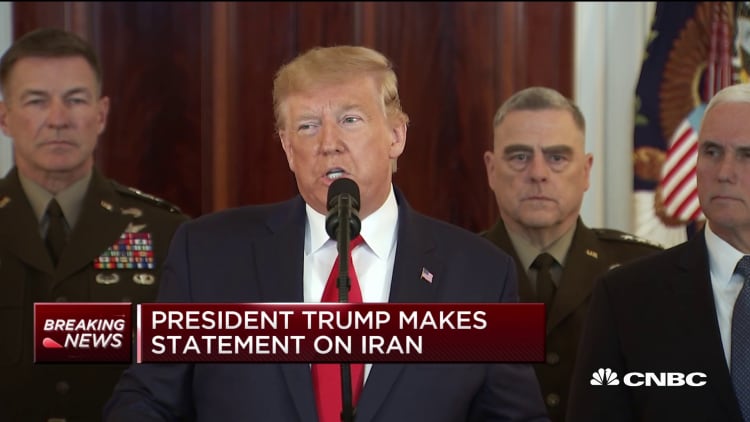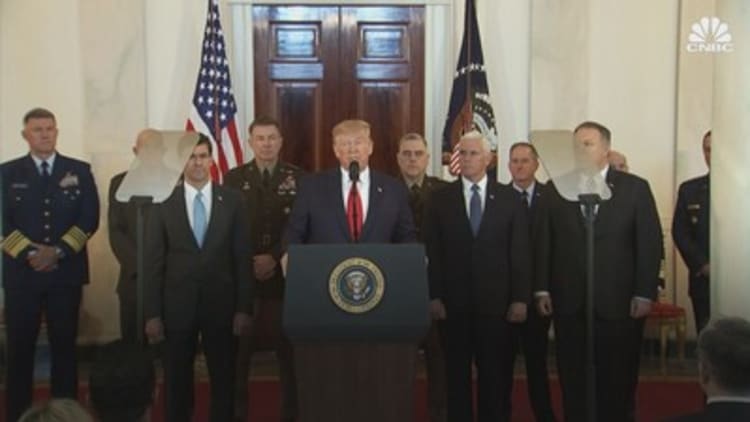
WASHINGTON — President Donald Trump said Wednesday that Iran "appears to be standing down" after it fired a barrage of missiles at American targets in Iraq in retaliation for the U.S. killing of Gen. Qasem Soleimani.
But the U.S. is continuing to look at its options, and will "immediately impose additional punishing economic sanctions on the Iranian regime," Trump said.
He also warned Tehran repeatedly to abandon its nuclear ambitions, vowing: "As long as I am president of the United States, Iran will never be allowed to have a nuclear weapon."
But he suggested that the U.S. is open to negotiations with Tehran. "We must all work together toward making a deal with Iran that makes the world a safer and more peaceful place," Trump said. He urged other world powers to break away from the Obama-era nuclear agreement with Iran and work out a new deal.
The president, speaking from the grand foyer of the White House, said no Americans were harmed in Iran's overnight attacks on two Iraqi bases that house U.S. forces.
Trump defended his administration's decision last week to kill Soleimani, saying the general's "hands were drenched in both American and Iranian blood."
Hours later at the Pentagon, the U.S. military's top general told reporters that Iran fired the missiles with the intent "to kill personnel."
Chairman of the Joint Chiefs of Staff Gen. Mark Milley praised early warning systems, which detected the incoming ballistic missiles well in advance, giving U.S. and coalition forces adequate time to take shelter at both bases.
He described the damage to tents, parking lots and a helicopter, among other things, as "nothing major."

"He should have been terminated long ago," Trump said.
Trump was flanked by Vice President Mike Pence, Secretary of State Mike Pompeo, Defense Secretary Mark Esper and the top officers of the nation's military branches. He spoke for about 10 minutes and took no questions.
Iran launched at least a dozen missiles from its territory Tuesday evening at two military bases in Iraq that house U.S. military and coalition forces.
The Iranian Revolutionary Guard Corps described the attacks as the beginning of their "fierce revenge" against the U.S. Late last week, a U.S. airstrike in Baghdad killed Soleimani, whom the Trump administration claims had planned attacks that were "days" away from execution.
In a speech following the missile attacks, Iran supreme leader Ayatollah Ali Khamenei called the barrage a "slap on the face" to the U.S.
"Such military actions are not enough," Khamenei tweeted.
But Iranian Foreign Minister Javad Zarif took a different tone, tweeting that his country "took and concluded proportionate measures" against the killing of Soleimani while adding that "We do not seek escalation or war, but will defend ourselves against any aggression."
After the attacks Tuesday night, Trump did not make a formal address — but said in a tweet that "all is well!"
"Missiles launched from Iran at two military bases located in Iraq," Trump tweeted. "Assessment of casualties & damages taking place now. So far, so good! We have the most powerful and well equipped military anywhere in the world, by far! I will be making a statement tomorrow morning."
Hours before the Iranian missile attacks, Esper said the U.S. was not seeking war with Iran.
"We are not looking to start a war with Iran, but we are prepared to finish one," Esper said, adding that Washington wants to see the situation de-escalate.
Earlier Tuesday, Pompeo said the U.S. "got it right" by killing Soleimani.
"It was the right decision," Pompeo said at the State Department. "The Department of Defense did excellent work. And the president had an entirely legal, appropriate and a basis as well as a decision that fit perfectly within our strategy in how to counter the threat of malign activity from Iran more broadly."
'This didn't start with the death of Soleimani'
Soleimani was killed by a U.S. airstrike at an airport in Baghdad on Friday, Iraq time.
Soleimani, who led a special forces unit of Iran's elite Revolutionary Guards, had been a key figure of Iranian and Middle East politics. His death exacerbated already-high tensions between Iran and the United States.
"There's still a lot of questions about the attacks last night, but the fact that there appear to be no casualties and that Iran provided defining language around the strike by warning the U.S. to not respond, and the fact that Trump took the night to access what was going on, gives the possibility that there is an off ramp," said Michelle Dover, director of programs at Ploughshares Fund.
"This didn't start with the death of Soleimani, this really started with Trump pulling the U.S. out of the Iran nuke deal and reimposing sanctions. The maximum pressure campaign is what has really led to this escalation."
Tensions between Tehran and Washington mounted following Trump's withdrawal from the landmark Iran nuclear deal brokered by the Obama administration.
The 2015 nuclear agreement lifted sanctions that crippled Iran's economy and cut its oil exports roughly in half. In exchange for sanctions relief, Iran accepted limits on its nuclear program and allowed international inspectors into its facilities.
On Sunday, Iran announced it would not abide by any limits established in the nuclear deal on the number of uranium enrichment centrifuges.
That means Iran would have no limit on its enrichment capacity, the level to which uranium could be enriched, or on its nuclear research and development. Iranian state-run broadcast said Tehran's steps could be reversed if Washington lifted its sanctions.
Last May, Iran stopped complying with some commitments in the nuclear deal after Trump in 2018 unilaterally withdrew from the agreement. Trump also reintroduced sanctions on Tehran that had been previously lifted in accordance with the nuclear deal.
The last year was marked by increased geopolitical turbulence including multiple attacks on tankers and oil infrastructure blamed on Tehran, the Iranian downing of a U.S. drone, Iran's suspected attack that briefly cut Saudi Arabian oil production in half, and increasingly heavy U.S. sanctions laid down on the Islamic Republic.

This is breaking news. Please check back for updates.
-- CNBC's Yelena Dzhanova contributed to this report.



